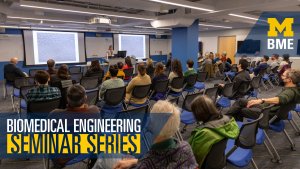Presented By: Biomedical Engineering
Tracing molecules through space and time to understand and treat disease
Biomedical Engineering (BME 500) Seminar Series - Christian Metallo, PhD

Abstract:
Metabolism is central to virtually all cellular functions and contributes to a range of diseases. A quantitative understanding of how biochemical pathways are dysregulated in the context of diseases such as cancer, metabolic syndrome, and neuropathy is necessary to identify new therapeutic targets. To this end we apply stable isotope tracers, mass spectrometry, and metabolic flux analysis (MFA) to study metabolism in mammalian cells, animal models, and human patients. We are particularly interested in understanding how amino acid and lipid metabolism are coordinated in the context of specific disease states. Serine, glycine and one carbon metabolism is critically important for cell function and health, but the amino acids associated with this pathway are commonly reduced in patients with metabolic syndrome. Here I will detail how we apply MFA and related methods to decipher why serine and glycine are reduced in mouse models of diabetes. At the same time, modulating dietary serine, glycine, and fat impacts lipid metabolism and neuropathy phenotypes in C57BL/6 mice. In turn, supplementation of serine improves sensory function in diabetic animals, suggesting potential therapeutic strategies for treating patients with serine-associated neuropathy. These data provide mechanistic insights into potential drivers diabetes co-morbidities and the role of amino acids in chronic disease.
Bio:
Christian Metallo is a professor in the Molecular and Cell Biology Laboratory and holds the Daniel and Martina Lewis Chair at the Salk Institute for Biological Studies. He received his BS in chemical engineering from the University of Pennsylvania and his PhD in chemical engineering from the University of Wisconsin-Madison. He completed a postdoctoral fellowship at MIT in chemical engineering studying cancer metabolism before starting his lab in the Bioengineering department at UC San Diego in 2011. He aims to understand how nutrition and metabolism contribute to diseases such as cancer, macular disease and peripheral neuropathy, applying metabolic flux analysis and biochemical engineering approaches to address these questions.
Zoom:
https://umich.zoom.us/j/91712262512
Metabolism is central to virtually all cellular functions and contributes to a range of diseases. A quantitative understanding of how biochemical pathways are dysregulated in the context of diseases such as cancer, metabolic syndrome, and neuropathy is necessary to identify new therapeutic targets. To this end we apply stable isotope tracers, mass spectrometry, and metabolic flux analysis (MFA) to study metabolism in mammalian cells, animal models, and human patients. We are particularly interested in understanding how amino acid and lipid metabolism are coordinated in the context of specific disease states. Serine, glycine and one carbon metabolism is critically important for cell function and health, but the amino acids associated with this pathway are commonly reduced in patients with metabolic syndrome. Here I will detail how we apply MFA and related methods to decipher why serine and glycine are reduced in mouse models of diabetes. At the same time, modulating dietary serine, glycine, and fat impacts lipid metabolism and neuropathy phenotypes in C57BL/6 mice. In turn, supplementation of serine improves sensory function in diabetic animals, suggesting potential therapeutic strategies for treating patients with serine-associated neuropathy. These data provide mechanistic insights into potential drivers diabetes co-morbidities and the role of amino acids in chronic disease.
Bio:
Christian Metallo is a professor in the Molecular and Cell Biology Laboratory and holds the Daniel and Martina Lewis Chair at the Salk Institute for Biological Studies. He received his BS in chemical engineering from the University of Pennsylvania and his PhD in chemical engineering from the University of Wisconsin-Madison. He completed a postdoctoral fellowship at MIT in chemical engineering studying cancer metabolism before starting his lab in the Bioengineering department at UC San Diego in 2011. He aims to understand how nutrition and metabolism contribute to diseases such as cancer, macular disease and peripheral neuropathy, applying metabolic flux analysis and biochemical engineering approaches to address these questions.
Zoom:
https://umich.zoom.us/j/91712262512